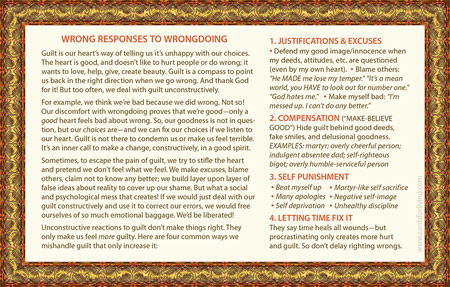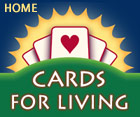Wrong response to wrongdoing
Guilt is our heart’s way of telling us it’s unhappy with our choices. The heart is good, and doesn’t like to hurt people or do wrong; it wants to love, help, give, create beauty. Guilt is a compass to point us back in the right direction when we go wrong. And thank God for it! But too often, we deal with guilt unconstructively.
For example, we think we’re bad because we did wrong. Not so! Our discomfort with wrongdoing proves that we’re good—only a good heart feels bad about wrong. So, our goodness is not in question, but our choices are—and we can fix our choices if we listen to our heart. Guilt is not there to condemn us or make us feel terrible. It’s an inner call to make a change, constructively, in a good spirit.
Sometimes, to escape the pain of guilt, we try to stifle the heart and pretend we don’t feel what we feel. We make excuses, blame others, claim not to know any better; we build layer upon layer of false ideas about reality to cover up our shame. But what a social and psychological mess that creates! If we would just deal with our guilt constructively and use it to correct our errors, we would free ourselves of so much emotional baggage. We’d be liberated!
Unconstructive reactions to guilt don’t make things right. They only make us feel more guilty. Here are four common ways we mishandle guilt that only increase it:
1. JUSTIFICATIONS & EXCUSES
•Defend my good image/innocence when my deeds, attitudes, etc. are questioned (even by my own heart).
•Blame others: “He MADE me lose my temper.” “It’s a mean world, you HAVE to look out for number one.” “God hates me.”
•Make myself bad: “I’m messed up. I can’t do any better.”
2. COMPENSATION (“MAKE-BELIEVE GOOD”) Hide guilt behind good deeds, fake smiles, and delusional goodness. EXAMPLES: martyr; overly cheerful person; indulgent absentee dad; self-righteous bigot; overly humble-serviceful person
3. SELF PUNISHMENT
Beat myself up
Many apologies
Self deprivation
Martyr-like self sacrifice
Negative self-image
Unhealthy discipline
4. LETTING TIME FIX IT
They say time heals all wounds—but procrastinating only creates more hurt and guilt. So don’t delay righting wrongs.

